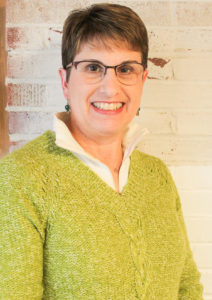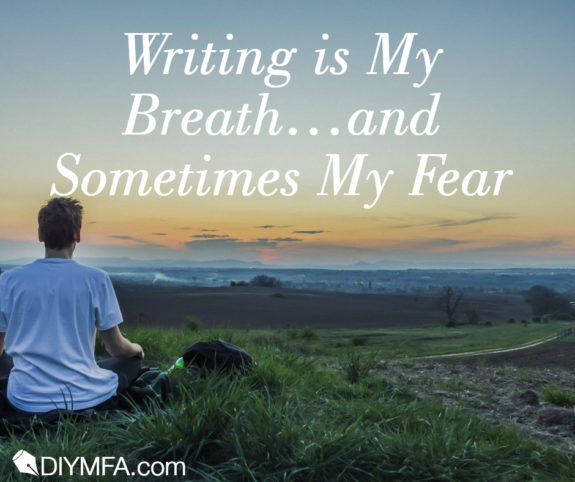It was such an incidental, fleeting moment…one that didn’t warrant special notice. And, yet, I noticed.
On the evening of May 30, 2017, my daughter, Nikky, and I attended one of the last performances by well-known singer and songwriter Sara Bareilles in the lead role of the musical “Waitress,” on Broadway. Right before the curtain went up, the actors could be seen taking their places behind the somewhat sheer curtain, an apron-wearing Bareilles front and center.
The image of what I saw after she stood on her mark—in those last few seconds before the curtain would rise—captivated me. Bareilles took a deep breath in, held it for a moment…then her shoulders relaxed. The breath was done; she was ready.
Writing is my breath. It is my sustenance and that which makes me feel ready to take on the rest of life. To inhale is to contemplate; to exhale is to relax the shoulders, put pen to paper or fingers on the keyboard, and let go of the thoughts that burden my soul or the emotions that light up my heart. Simply put, writing clears my head and makes me feel ready for whatever comes next.
When I’m writing—often at Starbucks, always with some kind of instrumental music flowing through earbuds—I can tune out most anything or anyone around me, except for the occasional loud talker. I’m not a fast writer; sometimes I’m painfully slow, which, more than anything, is probably due to my wanting to edit as I go along, rather than just getting it down the first time around.
The joy—I’d go so far as to say the exhilaration—for me (and I’m sure for many of you) is in the crafting of each sentence. Choosing words, playing with the rhythm and structure of sentences, creating interesting and elegant (but hopefully never pretentious) phrasing, demonstrating restraint in what I express and reveal. There are days when I can sit for hours and never tire of the craft of writing and be rewarded with several double-spaced pages (remember, I write slowly). There are other days when I produce only a few good sentences, and I’ll get up from a café table or my desk feeling wholly disappointed and discouraged. But, no matter if it comes on the heels of a good writing day or bad, we live to write another day, don’t we?
At sixty years of age, I have spent most of my life not as a writer, but as a wife, mother, school volunteer, PTO member, school director, and, following a three-year program in lay church ministry, providing grief support. That eventually led me to the chaplaincy training program at Hershey Medical Center, a level 1 trauma hospital.
Despite the many ways that hospital chaplaincy felt like the perfect fit for me, once I started to feel my “emotional legs” pulled out from under me because of the trauma cases I was involved in, I had to step away from it.
I suppose I knew early on in the healing process that there would come a time when I’d want to write about my experiences. For the past seven years, writing has been at the center of my healing journey from PTSD. In a very real sense, writing is what has helped me transform a dark, stuck life back to one that is joyful and productive. And now, by writing a memoir, I hope to use my story to help others.
Writing that story has been a journey unto itself.
There Have Been Times When Writing that Story has Been My Fear
What memories from the hospital would writing bring back? What feelings would writing stir up? What if writing about a particular experience brought all of the pain back again? Then what… how long will it take to get out from under it again?
Write What You Can Write, the Rest Will Come Later
There were some subjects, such as the deaths of two very young patients, that I couldn’t touch for five years. Whenever I tried writing such difficult scenes, my pen was like a match, igniting all of my emotions. I often questioned whether writing a memoir was even worth all of the energy and emotion it required. But I couldn’t let it go. I knew that writing would be a part of my way back. And I had this notion that something I write could make a difference for someone else.
Lately I’ve been thinking quite a bit about why I feel so passionate about writing.
If Writing is Sometimes a Fear, Then How Can it Also be My Breath?
The answer comes down to one word: Stories.
Now, more than ever, we need to tell our stories. We need to find the common threads of our humanity. We need to share our stories in order to provide comfort to others and find it for ourselves. We need to tell our stories as a way of saying, “I understand,” and “I’m with you.”
The stories I couldn’t write for five years because I was afraid of the memories that might get stirred up…what if the story of one of those scenes is the one that a reader connects with? What if that story helps them feel less alone? What if that story gives them hope? What if that story gives them their breath? That’s the difference our stories can make.
Each story I write breathes new life into my way of being in the world. It helps me to reflect on how I’ve made my way so far, perhaps what should change or stay the same going forward. Writing helps me get a better grasp on the “why” of things in life.
Writing is what breathes life into my connection with each of you. I pray that you hear me saying, “I understand,” and I’m with you.”
What is your breath? What’s the thing that feeds you and keeps you grounded? What prepares you to take on the rest of life? If you’d like to share your answer, I’d love to hear from you!

Tess Enterline is a creative nonfiction writer, currently working on her first memoir. She’s also a wife, mom, former hospital chaplain, dog lover, and fountain pen/stationery enthusiast (i.e., addict). You can visit her on her website at www.tessenterline.com.







